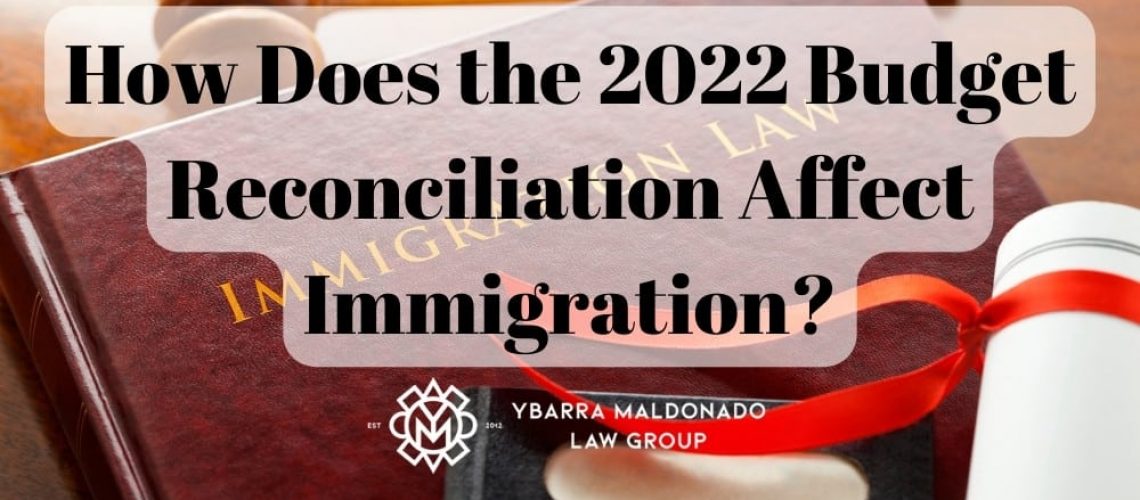If you’ve been keeping track of the news in recent months, you likely already know about the passage of the Inflation Reduction Act of 2022 (IRA). This landmark legislation passed through the Senate via a process called budget reconciliation. In many cases, pieces of legislation that intend to focus on one or two important topics end up with extra amendments tacked on that are unrelated to the original purpose. This is often done in an attempt to make legislation more appealing. The IRA focuses mainly on healthcare and climate change, but were there any budget reconciliation immigration changes?
At Ybarra Maldonado Law Group, one of our goals as a premier Phoenix law firm is to stay up to date on all policy changes that could affect immigration. Immigration reform is and has been a hot topic for many years, and this has contributed to the legal immigration system becoming more complex with time. However, if you have an immigration issue in Arizona, our skilled immigration lawyers are here to help. Our knowledge and years of experience give us the tools that we need to help you fight for your legal rights. To schedule a case evaluation with one of our Phoenix immigration attorneys, please call 602-910-4040 today.
What Is Budget Reconciliation?
Before we explore how the IRA 2022 affects immigration, we will explain what happens during the budget reconciliation process. The purpose of the budget reconciliation process is to make legislation easier to pass in the Senate. The reconciliation process itself is restricted to bills and legislation that concern revenue and spending. In other words, this process is reserved for certain budgetary issues. Additionally, only certain kinds of amendments are allowed for a reconciliation bill.
How Is a Reconciliation Bill Different from a Regular Bill?
Instead of requiring 60 votes to pass in the Senate, a reconciliation bill only requires a simple majority vote. This means that, in order to pass, the budget reconciliation package only needed 51 votes. Other important differences between reconciliation bills and regular bills include the following.
- Reconciliation starts with the budget resolution in Congress. It cannot be stalled by a filibuster in the Senate, nor does it require a presidential signature.
- Then, an expedited process of consideration begins in the Senate. The process limits both amendments and debate in order to achieve a faster resolution.
- Certain committees will receive instructions on how to adjust their budgets. They must do so in a way that meets the targets outlined in the reconciliation instructions.
The 2022 Budget Reconciliation: Immigration Reform

In this blog, we outline the significant changes that would occur to immigration policy if the reconciliation bill were to pass.
- Providing a pathway to citizenship for certain undocumented immigrants, essential workers, those with Temporary Protected Status (TPS), DACA recipients, and even farm workers.
- The immigration provisions in the bill would not only greatly benefit immigrant communities, but also the national economy.
Unfortunately, due to the “Byrd Rule,” immigration proposals did not make their way into the final reconciliation bill.
What Is the Byrd Rule?
The Byrd Rule is very important for lawmakers to understand, as it affects what can and cannot be added as an amendment to reconciliation bills. Basically, it restricts the addition of anything viewed as “extraneous” to the budget. Something is considered extraneous if it meets the following criteria.
- It does not result in a change to revenues or expenditures.
- It results in a deficit budgetary impact that is outside of the budget window.
- The amendment makes changes to Social Security.
While this rule only directly applies to Senate Democrats and Republicans, it still affects those in the House. For example, let’s say that bipartisan legislation involving immigration reforms emerges as a reconciliation bill from the House. Because of the Byrd Rule, these immigration provisions would be stricken from the legislation unless they directly affect the budget. Therefore, the House is unlikely to push for immigration reform if it would be easily stricken from the bill.
Results of the 2022 Budget Reconciliation
The precursor bill to the 2022 IRA was the Build Back Better plan (BBB). The Biden administration heavily backed this plan, with some support from democratic senators, but little republican support. It included certain provisions for immigration reform, including a pathway to citizenship and legal status for undocumented immigrants, TPS holders, Dreamers, immigrant workers, and other essential workers.
However, the Senate parliamentarian ultimately ruled that the provisions concerning immigrants were not permissible under the Byrd Rule. Thus, these provisions were not included in the final language of the IRA 2022.
What is to be celebrated about the passage of the IRA is that it lacks amendments that would negatively affect immigrants in the United States. Unlike many other pieces of legislation, which targeted undocumented immigrants and their families, the IRA did not.
Contact Ybarra Maldonado Law Group Today
Overall, the 2022 budget reconciliation’s impact on the immigration system was, at most, minimal. However, our Phoenix immigration lawyers believe that keeping up with the latest updates on border security, citizenship, green cards, and deportation are extremely important. Maintaining up-to-date knowledge of all the policies and pieces of legislation that may affect our clients is paramount. This is what allows us to achieve stellar results in the immigration cases we handle.
If you have any questions about immigration reform and how it affects you, or if you have an immigration case that we can help you with, please contact our Phoenix law office. To schedule your case evaluation with us, please call 602-910-4040 or fill out our online intake form today.


